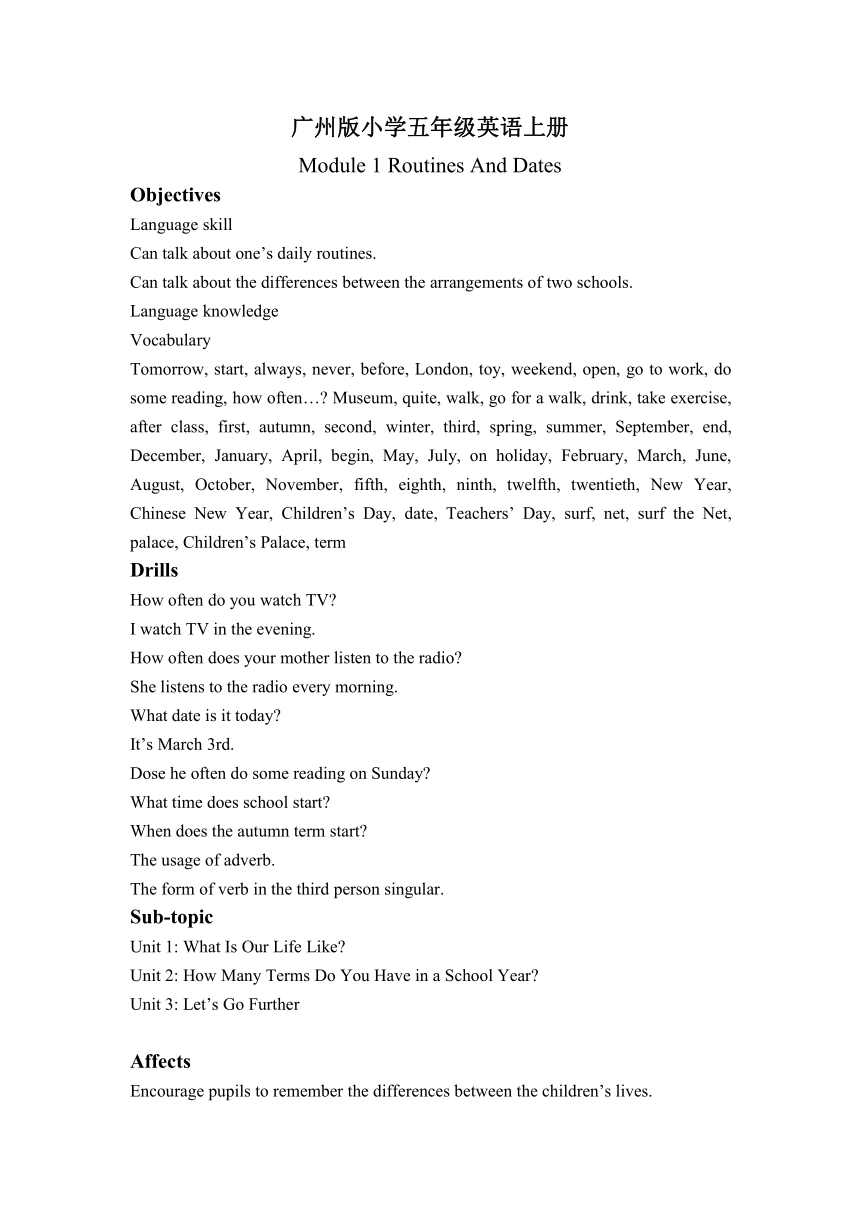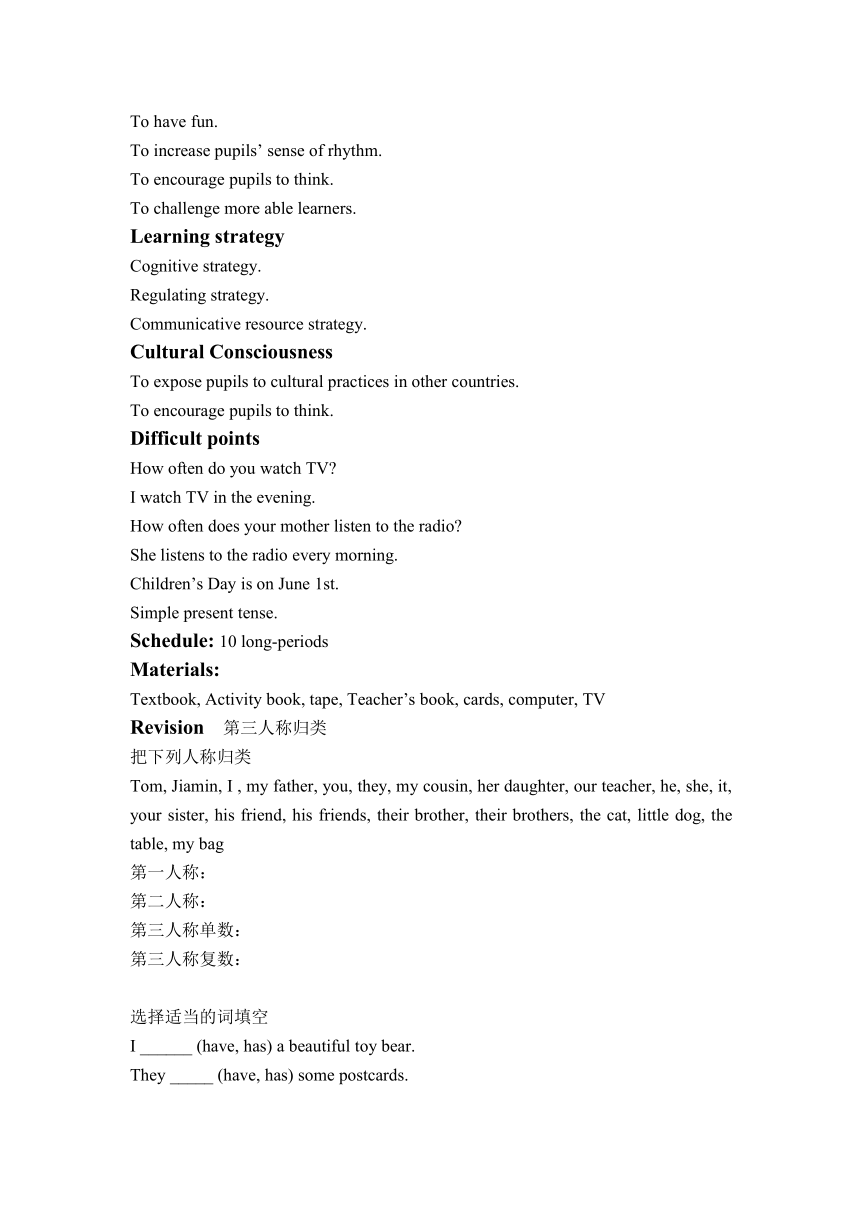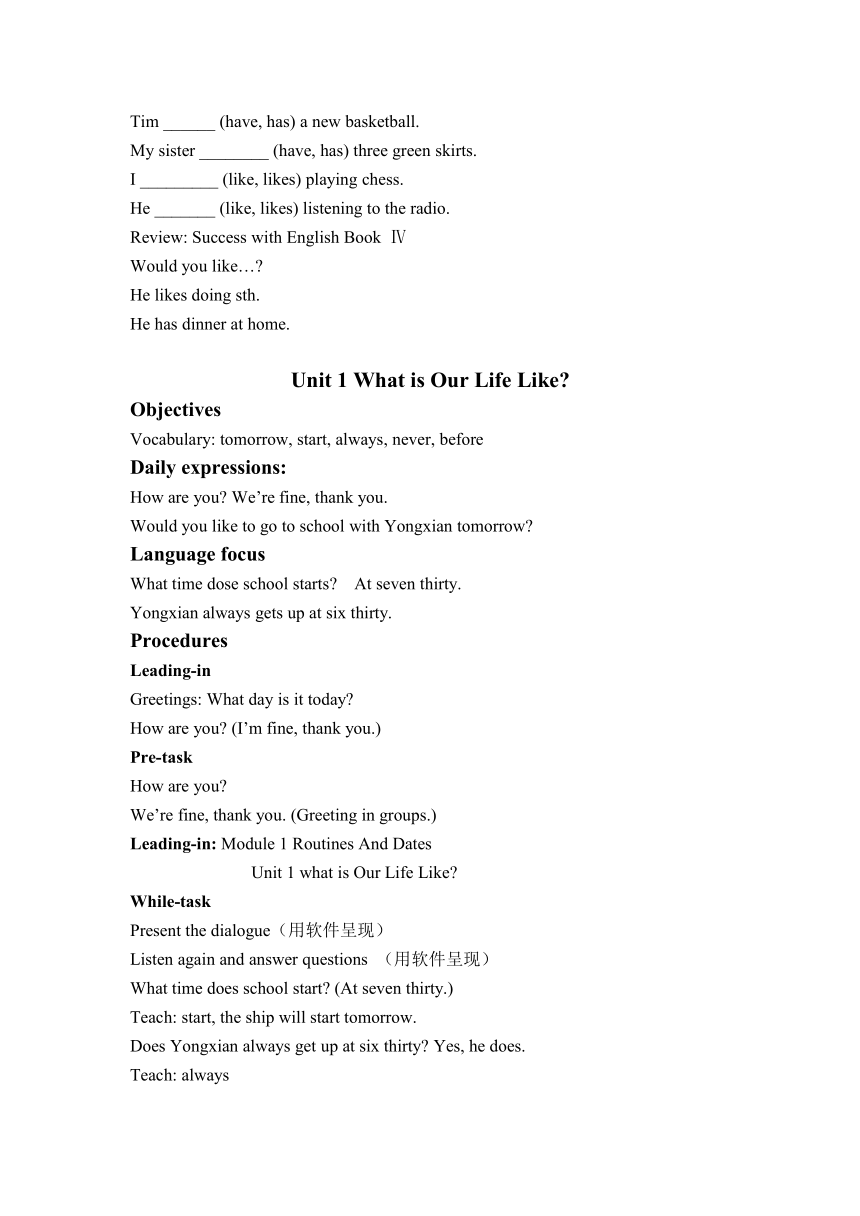(广州版)小学五年级英语上册 单元测试
图片预览



文档简介
广州版小学五年级英语上册
Module 1 Routines And Dates
Objectives
Language skill
Can talk about one’s daily routines.
Can talk about the differences between the arrangements of two schools.
Language knowledge
Vocabulary
Tomorrow, start, always, never, before, London, toy, weekend, open, go to work, do some reading, how often… Museum, quite, walk, go for a walk, drink, take exercise, after class, first, autumn, second, winter, third, spring, summer, September, end, December, January, April, begin, May, July, on holiday, February, March, June, August, October, November, fifth, eighth, ninth, twelfth, twentieth, New Year, Chinese New Year, Children’s Day, date, Teachers’ Day, surf, net, surf the Net, palace, Children’s Palace, term
Drills
How often do you watch TV
I watch TV in the evening.
How often does your mother listen to the radio
She listens to the radio every morning.
What date is it today
It’s March 3rd.
Dose he often do some reading on Sunday
What time does school start
When does the autumn term start
The usage of adverb.
The form of verb in the third person singular.
Sub-topic
Unit 1: What Is Our Life Like
Unit 2: How Many Terms Do You Have in a School Year
Unit 3: Let’s Go Further
Affects
Encourage pupils to remember the differences between the children’s lives.
To have fun.
To increase pupils’ sense of rhythm.
To encourage pupils to think.
To challenge more able learners.
Learning strategy
Cognitive strategy.
Regulating strategy.
Communicative resource strategy.
Cultural Consciousness
To expose pupils to cultural practices in other countries.
To encourage pupils to think.
Difficult points
How often do you watch TV
I watch TV in the evening.
How often does your mother listen to the radio
She listens to the radio every morning.
Children’s Day is on June 1st.
Simple present tense.
Schedule: 10 long-periods
Materials:
Textbook, Activity book, tape, Teacher’s book, cards, computer, TV
Revision 第三人称归类
把下列人称归类
Tom, Jiamin, I , my father, you, they, my cousin, her daughter, our teacher, he, she, it, your sister, his friend, his friends, their brother, their brothers, the cat, little dog, the table, my bag
第一人称:
第二人称:
第三人称单数:
第三人称复数:
选择适当的词填空
I ______ (have, has) a beautiful toy bear.
They _____ (have, has) some postcards.
Tim ______ (have, has) a new basketball.
My sister ________ (have, has) three green skirts.
I _________ (like, likes) playing chess.
He _______ (like, likes) listening to the radio.
Review: Success with English Book Ⅳ
Would you like…
He likes doing sth.
He has dinner at home.
Unit 1 What is Our Life Like
Objectives
Vocabulary: tomorrow, start, always, never, before
Daily expressions:
How are you We’re fine, thank you.
Would you like to go to school with Yongxian tomorrow
Language focus
What time dose school starts At seven thirty.
Yongxian always gets up at six thirty.
Procedures
Leading-in
Greetings: What day is it today
How are you (I’m fine, thank you.)
Pre-task
How are you
We’re fine, thank you. (Greeting in groups.)
Leading-in: Module 1 Routines And Dates
Unit 1 what is Our Life Like
While-task
Present the dialogue(用软件呈现)
Listen again and answer questions (用软件呈现)
What time does school start (At seven thirty.)
Teach: start, the ship will start tomorrow.
Does Yongxian always get up at six thirty Yes, he does.
Teach: always
Practice: … always gets up at six thirty.
Does Tom get up at six thirty No, he doesn’t.
Tom says: I never get up before 7:30.
Present: never, before
Practice: I never get up before…
Whole class read and remembers the new words.
Listen and read the dialogue.
Read in groups.
Post-task
Ask two groups to read the dialogue.
Underline some phrases.
Homework
Listen and read the dialogue.
Copy the new words.
Remember the phrases.
Layout Module 1 Routine and Dates
Unit 1 what is Our Life Like
How are you Tomorrow today
We’re fine, thank you. Start star
Always
What time does school start Never
At seven thirty. Before
Dongxiang always gets up at six thirty.
I never get up before seven thirty.
Unit 1 what is Our Life Like 第二课时
Objectives
Vocabulary: London, toy, weekend, open
Language focus:
I sometimes eat noodles at my friend Sarah’s.
We usually go shopping at the weekend.
Procedures
Leading-in
Greetings: How are you What day/ date is it today
Review the new words and dialogue.
Pre-task
Act out the dialogue P2
Tom and Rose are at their friend Yongxian’s. Look! What are they doing (课件呈现)
While-task
Look and listen
Listen again
Ask students to find out what they don’t know.
Underline the main point and explain
New words: London, toy, weekend, open,
at my friend Sarah’s=at my friend Sarah’s home
Listen and read after the tape
Read in groups
Post-task
Read the dialogue in four.
Ask some groups to read.
Homework
Listen and read the dialogue.
Copy the new words.
Remember the phrases.
Layout
at my friend Sarah’s London
=at my friend Sarah’s home toy boy
weekend weak
open
Unit 1 What is Our Life Like 第三课时
Objectives
1. Work with language 1, 2
2. Vocabulary: go to work, do some reading
Procedures
Revision
Look and spell the new words.
Whole class read Unit 1 dialogue
Ask the students to act out the dialogue.
Presentation
(1) Work with language 1
Put the words on the line.
Check their answers in groups.
(2) Ask students to make sentences in groups.
I never/ sometimes/ often/ usually/ always…
(3) I usually get up at seven thirty. But my father usually gets up at six thirty.
(4) But my father usually goes to work/ does some reading at…
Present: go to work, do some reading
(5) The form of verb in the third person singular. o,s,x,ch,sh+es
(6) Fill in the forms in pairs.
Exercises
Read their sentences in groups.
Homework
Listen and read Unit 1 Dialogue and Work with language
Work with language 2
Layout
0% never sometimes often usually always 100%
goes to school does some reading
Unit 1 What is Our Life Like 第四课时
Objectives
1. Work with language 3
Vocabulary:
How often…. Surf the Net, museum, quite, Children’s Palace,
Go for a walk, drink, take exercise, after class
Drills
How often do you watch TV
How often does she watch TV
Procedures
Leading-in and pre-task
Act out Unit 1 Dialogue
Make sentences with: never, sometimes, often, usually, and always
While – task
Look and say according to the key words:
I watch TV every evening
Present: museum, quite, drink,
Go for a walk, surf the Net, Children’s Palace, take exercise, after class
Spell – remember – check
Show two puppies. (用课件呈现)
A: How often do you watch TV
B: I watch TV every evening.
Practice in pairs according to the key words
Present three puppies
C: How often does she watch TV
A: She watches TV every evening.
Practice in four according to the key words
Post – task
Make some sentences with “How often… ”
Activity book Ex.3
Homework:
1. Activity book Ex. 3-4
2. Read work with language
Layout.
Museum
Quite
Drink ink
Go for a walk talk
Surf
Children’s Palace place
After class
After exercise
How often do you watch TV
I watch TV every evening.
How often does she watch TV
She watches TV every evening
Module 1 Routines And Dates
Objectives
Language skill
Can talk about one’s daily routines.
Can talk about the differences between the arrangements of two schools.
Language knowledge
Vocabulary
Tomorrow, start, always, never, before, London, toy, weekend, open, go to work, do some reading, how often… Museum, quite, walk, go for a walk, drink, take exercise, after class, first, autumn, second, winter, third, spring, summer, September, end, December, January, April, begin, May, July, on holiday, February, March, June, August, October, November, fifth, eighth, ninth, twelfth, twentieth, New Year, Chinese New Year, Children’s Day, date, Teachers’ Day, surf, net, surf the Net, palace, Children’s Palace, term
Drills
How often do you watch TV
I watch TV in the evening.
How often does your mother listen to the radio
She listens to the radio every morning.
What date is it today
It’s March 3rd.
Dose he often do some reading on Sunday
What time does school start
When does the autumn term start
The usage of adverb.
The form of verb in the third person singular.
Sub-topic
Unit 1: What Is Our Life Like
Unit 2: How Many Terms Do You Have in a School Year
Unit 3: Let’s Go Further
Affects
Encourage pupils to remember the differences between the children’s lives.
To have fun.
To increase pupils’ sense of rhythm.
To encourage pupils to think.
To challenge more able learners.
Learning strategy
Cognitive strategy.
Regulating strategy.
Communicative resource strategy.
Cultural Consciousness
To expose pupils to cultural practices in other countries.
To encourage pupils to think.
Difficult points
How often do you watch TV
I watch TV in the evening.
How often does your mother listen to the radio
She listens to the radio every morning.
Children’s Day is on June 1st.
Simple present tense.
Schedule: 10 long-periods
Materials:
Textbook, Activity book, tape, Teacher’s book, cards, computer, TV
Revision 第三人称归类
把下列人称归类
Tom, Jiamin, I , my father, you, they, my cousin, her daughter, our teacher, he, she, it, your sister, his friend, his friends, their brother, their brothers, the cat, little dog, the table, my bag
第一人称:
第二人称:
第三人称单数:
第三人称复数:
选择适当的词填空
I ______ (have, has) a beautiful toy bear.
They _____ (have, has) some postcards.
Tim ______ (have, has) a new basketball.
My sister ________ (have, has) three green skirts.
I _________ (like, likes) playing chess.
He _______ (like, likes) listening to the radio.
Review: Success with English Book Ⅳ
Would you like…
He likes doing sth.
He has dinner at home.
Unit 1 What is Our Life Like
Objectives
Vocabulary: tomorrow, start, always, never, before
Daily expressions:
How are you We’re fine, thank you.
Would you like to go to school with Yongxian tomorrow
Language focus
What time dose school starts At seven thirty.
Yongxian always gets up at six thirty.
Procedures
Leading-in
Greetings: What day is it today
How are you (I’m fine, thank you.)
Pre-task
How are you
We’re fine, thank you. (Greeting in groups.)
Leading-in: Module 1 Routines And Dates
Unit 1 what is Our Life Like
While-task
Present the dialogue(用软件呈现)
Listen again and answer questions (用软件呈现)
What time does school start (At seven thirty.)
Teach: start, the ship will start tomorrow.
Does Yongxian always get up at six thirty Yes, he does.
Teach: always
Practice: … always gets up at six thirty.
Does Tom get up at six thirty No, he doesn’t.
Tom says: I never get up before 7:30.
Present: never, before
Practice: I never get up before…
Whole class read and remembers the new words.
Listen and read the dialogue.
Read in groups.
Post-task
Ask two groups to read the dialogue.
Underline some phrases.
Homework
Listen and read the dialogue.
Copy the new words.
Remember the phrases.
Layout Module 1 Routine and Dates
Unit 1 what is Our Life Like
How are you Tomorrow today
We’re fine, thank you. Start star
Always
What time does school start Never
At seven thirty. Before
Dongxiang always gets up at six thirty.
I never get up before seven thirty.
Unit 1 what is Our Life Like 第二课时
Objectives
Vocabulary: London, toy, weekend, open
Language focus:
I sometimes eat noodles at my friend Sarah’s.
We usually go shopping at the weekend.
Procedures
Leading-in
Greetings: How are you What day/ date is it today
Review the new words and dialogue.
Pre-task
Act out the dialogue P2
Tom and Rose are at their friend Yongxian’s. Look! What are they doing (课件呈现)
While-task
Look and listen
Listen again
Ask students to find out what they don’t know.
Underline the main point and explain
New words: London, toy, weekend, open,
at my friend Sarah’s=at my friend Sarah’s home
Listen and read after the tape
Read in groups
Post-task
Read the dialogue in four.
Ask some groups to read.
Homework
Listen and read the dialogue.
Copy the new words.
Remember the phrases.
Layout
at my friend Sarah’s London
=at my friend Sarah’s home toy boy
weekend weak
open
Unit 1 What is Our Life Like 第三课时
Objectives
1. Work with language 1, 2
2. Vocabulary: go to work, do some reading
Procedures
Revision
Look and spell the new words.
Whole class read Unit 1 dialogue
Ask the students to act out the dialogue.
Presentation
(1) Work with language 1
Put the words on the line.
Check their answers in groups.
(2) Ask students to make sentences in groups.
I never/ sometimes/ often/ usually/ always…
(3) I usually get up at seven thirty. But my father usually gets up at six thirty.
(4) But my father usually goes to work/ does some reading at…
Present: go to work, do some reading
(5) The form of verb in the third person singular. o,s,x,ch,sh+es
(6) Fill in the forms in pairs.
Exercises
Read their sentences in groups.
Homework
Listen and read Unit 1 Dialogue and Work with language
Work with language 2
Layout
0% never sometimes often usually always 100%
goes to school does some reading
Unit 1 What is Our Life Like 第四课时
Objectives
1. Work with language 3
Vocabulary:
How often…. Surf the Net, museum, quite, Children’s Palace,
Go for a walk, drink, take exercise, after class
Drills
How often do you watch TV
How often does she watch TV
Procedures
Leading-in and pre-task
Act out Unit 1 Dialogue
Make sentences with: never, sometimes, often, usually, and always
While – task
Look and say according to the key words:
I watch TV every evening
Present: museum, quite, drink,
Go for a walk, surf the Net, Children’s Palace, take exercise, after class
Spell – remember – check
Show two puppies. (用课件呈现)
A: How often do you watch TV
B: I watch TV every evening.
Practice in pairs according to the key words
Present three puppies
C: How often does she watch TV
A: She watches TV every evening.
Practice in four according to the key words
Post – task
Make some sentences with “How often… ”
Activity book Ex.3
Homework:
1. Activity book Ex. 3-4
2. Read work with language
Layout.
Museum
Quite
Drink ink
Go for a walk talk
Surf
Children’s Palace place
After class
After exercise
How often do you watch TV
I watch TV every evening.
How often does she watch TV
She watches TV every evening
同课章节目录
- Module 1 Hobbies
- Unit 1 What's your hobby?
- Unit 2 His hobby is drawing
- Module 2 Abilities
- Unit 3 I can swim very fast
- Unit 4 Can you do homework?
- Module 3 Daily life
- Unit 5 Where is Ben?
- Unit 6 At the weekend
- Module 4 Foods and drinks
- Unit 7 Do you want coffee or tea?
- Unit 8 Let's have both
- Module 5 Foods we need
- Unit 9 It smells delicious
- Unit 10 Different tastes
- Module 6 Weathe
- Unit 11 What's the weather like today?
- Unit 12 Four seasons in one day
- Module 7 Let's look back
